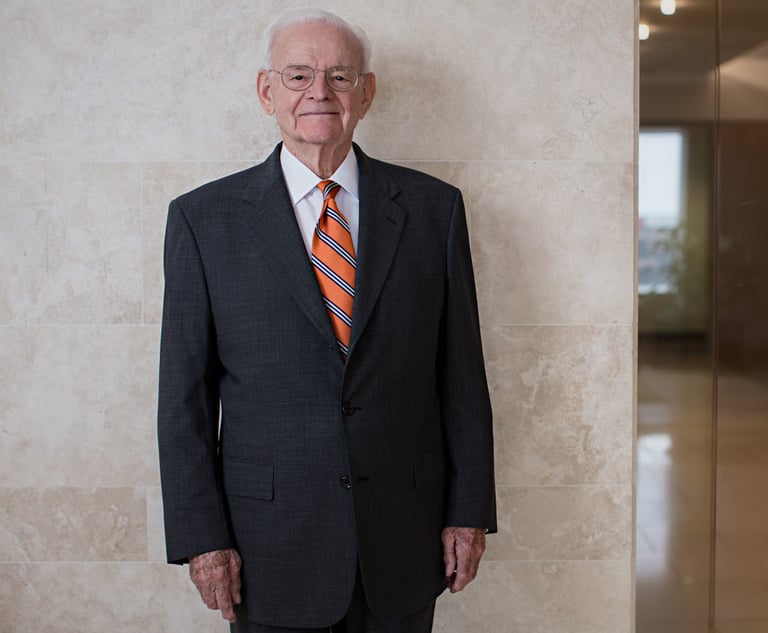How a Maritime Lawyer and Raw Sugar Charted a Course for FOIA
Raw sugar, coconuts and rubber are the little-known originators of the Freedom of Information Act, the federal law that governs the release of public records.
August 30, 2018 at 12:07 PM
6 minute read
 Terry Mutchler
Terry Mutchler
Secrets of Transparency
Starting this column with the words maritime lawyer and raw sugar might mistakenly lead the reader to believe I'm writing about a lawyer and a friend of Stormy Daniels.
However, raw sugar, coconuts and rubber are the little-known originators of the Freedom of Information Act, the federal law that governs the release of public records.
Mark P. Schlefer, a Washington, D.C. maritime and shipping lawyer, represented the Pacific Far East Lines, whose vessels sailed through Malaysia, Singapore and Indonesia. The ships loaded coconuts, raw sugar and rubber in the 1950s and 1960s. The company wanted to add to its route the Mariana Islands, a crescent-shaped archipelago in the western Pacific Ocean that form the U.S. Commonwealth of Northern Mariana Islands. The better known of islands is Guam, a U.S. territory.
Schlefer filed the necessary tariff documentation with the U.S. Federal Maritime Commission, which regulates the U.S. international ocean transportation system, U.S. importers and exporters and had jurisdiction.
Commission staff called Schlefer and informed him that the general counsel of the commission, James Pimper, declared the tariffs illegal, preventing his client from servicing the Mariana Islands. Naturally, Schlefer asked for a copy of the formal opinion but was promptly told that the general counsel deemed his opinion to be confidential.
To be clear: the general counsel was a government lawyer, working for a government agency, receiving a taxpayer-paid salary, and issued a formal binding decision of U.S. government. Yet, unilaterally he deemed his decision on tariffs to be “confidential.”
The lawyer could not see a copy of the government record, much less challenge it. The problem Schlefer faced then is not uncommon today—citizens often cannot meaningfully monitor or challenge a policy or decision of the federal government without obtaining a copy of the records at issue.
Undeterred, Schlefer took two strategic actions: one on behalf of his client; the second on behalf of transparency advocates for decades to come.
He informed the commission that he was advising his client to proceed with adding the Mariana Islands to their shipping route. He told the federal agency that Pimper could file suit to stop the service if he chose. Pimper might refuse to share his decision with the shipping lawyer, but he surely would have to disclose the decision and the agency reasons to a federal bench.
Schlefer's second move? He gathered a small cadre of maritime and shipping lawyers to create a codified crowbar of sorts to pry open government filing cabinets by law. He approached the practice and procedure committee of the American Bar Association to suggest drafting a bill to permit citizen access to government documents. Schlefer, and lawyers in other fields who also had been denied access to government decisions and records, worked with ABA lawyers, to draft the original version of the Freedom of Information Act (FOIA).
President Lyndon B. Johnson's entire cabinet was against the legislation. Members of Congress were leery fearing that all government secrets, particularly at the height of the Cold War, would harm U.S. interests and reveal also the domestic actions of government. They came aboard when Congress was exempted in an early draft of the law. The Office of the President and the Office of Vice President unfortunately also were exempted from coverage as is the judiciary. All of those exemptions remain in place today.
However, every federal agency is subject to the law and their nine key exemptions of types of documents that are not available, involving national security, trade secrets, confidential proprietary information and the like. President Johnson signed the legislation on July 4, 1966. FOIA gives citizens a statutory right to access records—and a right that is enforceable in court—something that is becoming more and more necessary in the wake of this administration.
In one of many cases interpreting the law, the U.S. Supreme Court eloquently and meaningfully framed FOIA this way: “FOIA is often explained as the means for citizens to know what the government is up to. This phrase should not be dismissed as a convenient formalism. It defines a structural necessity in a real democracy.”
Schlefer recounted in a Washington Post op-ed in 2016—the 50th anniversary of FOIA—that he never set out to solve a national problem. But that's exactly what the maritime maverick accomplished: he opened the channels for hundreds of thousands of government records to be made public.
People tend to think of FOIA as solely a tool for journalists. Many often overlook that FOIA's implications reach far beyond the government filing cabinets where the records are stored: FOIA is a fulcrum for obtaining police reports, government spying procedures; medical device and treatment submissions, and, or in Schlefer's case, a tariff decision. (Pimper never filed suit to stop the shipping vessels).
Records access laws—at both the state and federal level—are great tools for keeping an eye on the workings of government and knowing how taxpayer money is spent. Obtaining public records also can be a competitive tool to better understand your own industry whether its big pharma, maritime law or wealth management. There is a treasure trove of information that can be transformed into competitive edge for one who understands the intricacies of this important law.
Thomas Jefferson warned that “we in America do not have democracy by the majority. We have democracy by the majority who participate.”
In my expert opinion, to protect FOIA, citizens must use FOIA; otherwise it will atrophy along with democracy itself.
Terry Mutchler is the managing partner of Mutchler Lyons, the nation's first transparency law firm devoted to helping media, corporations and wealth managers obtain public records. She served as the founding executive director of Pennsylvania's Office of Open Records, and served as Illinois' first public access counselor enforcing Sunshine Laws. She is author of the best-selling memoir, “Under This Beautiful Dome,” (Seal 2014). Contact her at [email protected]
This content has been archived. It is available through our partners, LexisNexis® and Bloomberg Law.
To view this content, please continue to their sites.
Not a Lexis Subscriber?
Subscribe Now
Not a Bloomberg Law Subscriber?
Subscribe Now
NOT FOR REPRINT
© 2025 ALM Global, LLC, All Rights Reserved. Request academic re-use from www.copyright.com. All other uses, submit a request to [email protected]. For more information visit Asset & Logo Licensing.
You Might Like
View All
Judge Louis C. Bechtle: An American Jurist Who Relied on Common Sense, Sound Judgment and Fairness
5 minute read
Six Ways Thought Leadership Can Support Your Law Firm’s 2025 Strategic Plan
6 minute read
Trending Stories
Who Got The Work
Michael G. Bongiorno, Andrew Scott Dulberg and Elizabeth E. Driscoll from Wilmer Cutler Pickering Hale and Dorr have stepped in to represent Symbotic Inc., an A.I.-enabled technology platform that focuses on increasing supply chain efficiency, and other defendants in a pending shareholder derivative lawsuit. The case, filed Oct. 2 in Massachusetts District Court by the Brown Law Firm on behalf of Stephen Austen, accuses certain officers and directors of misleading investors in regard to Symbotic's potential for margin growth by failing to disclose that the company was not equipped to timely deploy its systems or manage expenses through project delays. The case, assigned to U.S. District Judge Nathaniel M. Gorton, is 1:24-cv-12522, Austen v. Cohen et al.
Who Got The Work
Edmund Polubinski and Marie Killmond of Davis Polk & Wardwell have entered appearances for data platform software development company MongoDB and other defendants in a pending shareholder derivative lawsuit. The action, filed Oct. 7 in New York Southern District Court by the Brown Law Firm, accuses the company's directors and/or officers of falsely expressing confidence in the company’s restructuring of its sales incentive plan and downplaying the severity of decreases in its upfront commitments. The case is 1:24-cv-07594, Roy v. Ittycheria et al.
Who Got The Work
Amy O. Bruchs and Kurt F. Ellison of Michael Best & Friedrich have entered appearances for Epic Systems Corp. in a pending employment discrimination lawsuit. The suit was filed Sept. 7 in Wisconsin Western District Court by Levine Eisberner LLC and Siri & Glimstad on behalf of a project manager who claims that he was wrongfully terminated after applying for a religious exemption to the defendant's COVID-19 vaccine mandate. The case, assigned to U.S. Magistrate Judge Anita Marie Boor, is 3:24-cv-00630, Secker, Nathan v. Epic Systems Corporation.
Who Got The Work
David X. Sullivan, Thomas J. Finn and Gregory A. Hall from McCarter & English have entered appearances for Sunrun Installation Services in a pending civil rights lawsuit. The complaint was filed Sept. 4 in Connecticut District Court by attorney Robert M. Berke on behalf of former employee George Edward Steins, who was arrested and charged with employing an unregistered home improvement salesperson. The complaint alleges that had Sunrun informed the Connecticut Department of Consumer Protection that the plaintiff's employment had ended in 2017 and that he no longer held Sunrun's home improvement contractor license, he would not have been hit with charges, which were dismissed in May 2024. The case, assigned to U.S. District Judge Jeffrey A. Meyer, is 3:24-cv-01423, Steins v. Sunrun, Inc. et al.
Who Got The Work
Greenberg Traurig shareholder Joshua L. Raskin has entered an appearance for boohoo.com UK Ltd. in a pending patent infringement lawsuit. The suit, filed Sept. 3 in Texas Eastern District Court by Rozier Hardt McDonough on behalf of Alto Dynamics, asserts five patents related to an online shopping platform. The case, assigned to U.S. District Judge Rodney Gilstrap, is 2:24-cv-00719, Alto Dynamics, LLC v. boohoo.com UK Limited.
Featured Firms
Law Offices of Gary Martin Hays & Associates, P.C.
(470) 294-1674
Law Offices of Mark E. Salomone
(857) 444-6468
Smith & Hassler
(713) 739-1250






